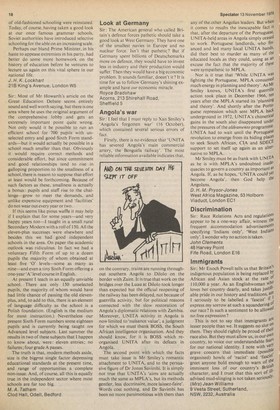Spectator 13 November 1976 any of the.other Angolan leaders. But
when it comes to results the inescapable fact IS that, after the departure of the Portuguese, UNITA-held areas in Angola simply ceased to work. Portuguese landlords, who fin' anced and led many local UNITA bands, did their best to murder as many of the educated locals as they could, using as an excuse the fact that the majority of these were sympathetic to MPLA.
Nor is it true that 'While UNITA was lighting the Portuguese, MPLA consumed much energy in planning and theory'. As Mr Smiley knows, UNITA's first guerrilla action took place in December 1966, ten years after the MPLA started its 'planning and theory'. And shortly after the Portuguese repression which sent MPLA back underground in 1972, UNITA's chimerical gains in the south also disappeared under the pressures of the aldeatnento programme. UNITA had to wait until the Portuguese revolution to emerge from its hiding places to seek South African, CIA and SDECE support to set itself up again as an alternative to MPLA.
Mr Smiley must be as frank with UNITA as he is with MPLA's undoubted inadequacies to govern a country as important as Angola. If, as he hopes, 'UNITA could Yet become Angola', then God help the An
D. H. M. Prysor-Jones West Africa Magazine, 53 Holborn Viaduct, London EC1


































 Previous page
Previous page